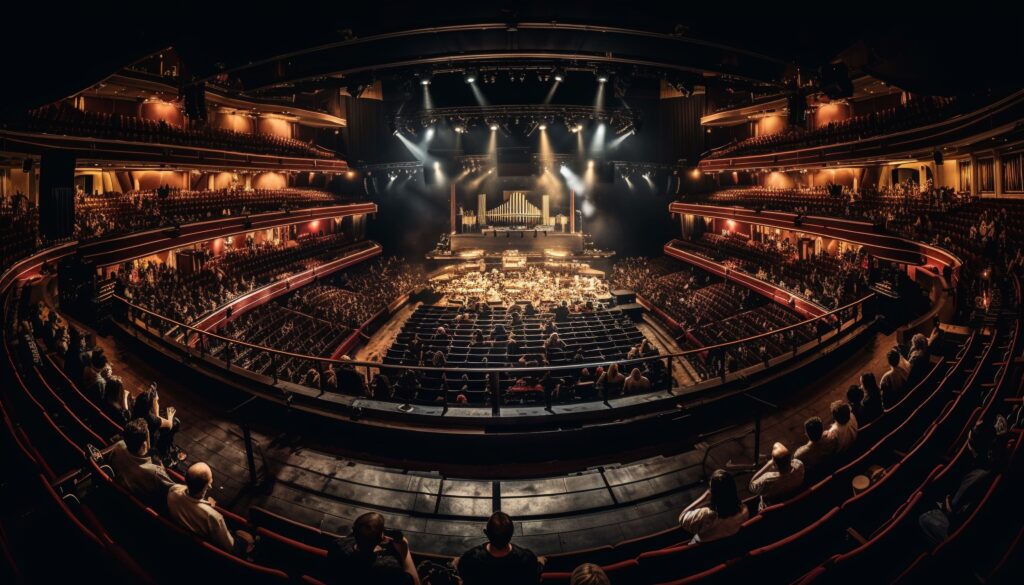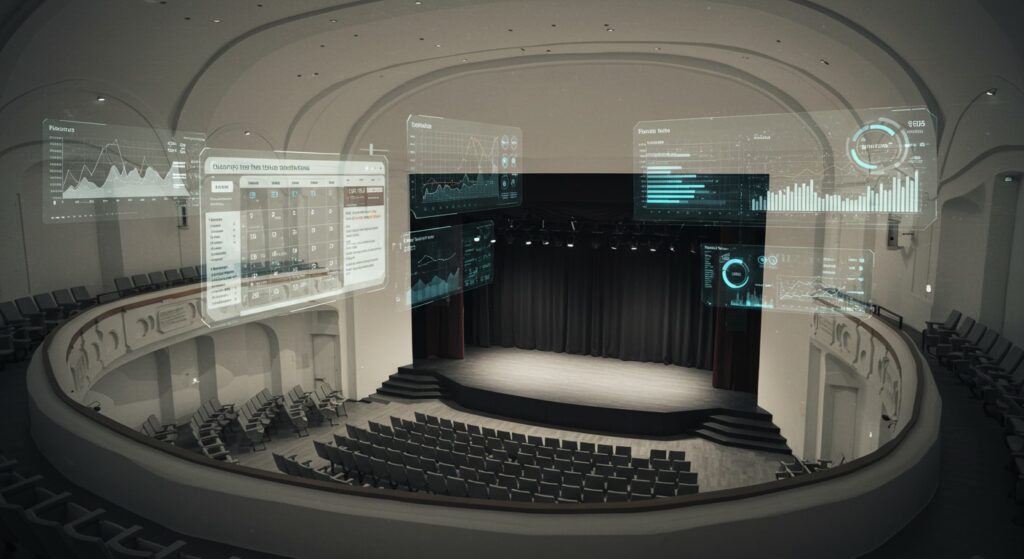
How Venues Can Harness Data for Informed Live Event Decisions
Today’s live event venues have more tools at their disposal than ever before to help improve profitability and enhance the guest experience. By gaining access to new data insights, venues can harness a wealth of valuable information and use it to ensure greater success. With live events, the stakes are high, and decisions based on intuition or past experiences often aren’t enough.
Employing concert venue management software offers a solution to these challenges and enables data-driven decision-making. As the live event industry evolves, these tools are quickly becoming essential for improving operational efficiencies and so much more. Learn more about these tools and how you can use them to revolutionize your live event venue’s performance.
The Importance of Data-Driven Decision-Making in Live Event Venues
In the live music industry, every decision can have a significant impact on your bottom line. Nothing can compete with the precision and foresight offered by data-driven decision-making.
When harnessed effectively, data provides a wealth of insights that can help you optimize your operations, predict trends, and stay ahead of the curve. It’s like having a crystal ball that allows you to see into the future of your venue, enabling you to make strategic decisions that can drive profitability and enhance every show.
Data-driven decision-making is not just about optimizing current operations but also about opening up your business to new avenues for innovation. The latest tools allow venues to identify gaps in their services, explore new market opportunities, and create new event concepts that respond to audience demands.
Leveraging Advanced Software Solutions for Data Collection and Analysis
The live event industry has changed dramatically over the past few decades. As technologies have evolved, so too has the importance of updated tools within business operations. New technologies like concert venue management software not only help in gathering and analyzing data but also provide real-time analytics and comprehensive reporting capabilities.
The beauty of this software is its ability to collect a wide range of data, from ticket sales and audience demographics to event costs and revenue. This data is then analyzed and presented in an intuitive and easy-to-understand format, providing the insights you need to make informed decisions.
Detailed Financial Reporting Tools
For modern successful venues, tracking revenue and expenses is important. However, understanding the financial trends and patterns that can inform strategic decisions is what sets the best venues apart. This is where detailed financial reporting tools come into play.
These tools provide a comprehensive overview of your venue’s financial health. They track and analyze a variety of financial data, including ticket sales, event costs, and revenue. This data is presented in detailed reports that offer insights into your venue’s financial performance.
The value of these tools goes beyond just providing numbers. Advanced software from top providers offers a deep dive into your finances, highlighting trends, identifying potential areas of concern, and suggesting opportunities for growth. For instance, by analyzing ticket sales data, you can identify which types of events or performances are most profitable, helping you make informed decisions about future bookings.
In addition, these tools can also help streamline your financial operations. By automating the process of collecting and analyzing data, they save time and reduce the risk of errors, allowing you to focus more on strategic decision-making and less on crunching numbers.
Historical Data Analysis
In addition to financial reporting tools, leading software offers another powerful capability: historical data analysis. This involves examining past data to gain insights into trends, patterns, and potential future outcomes. It’s like looking in the rearview mirror to understand the road ahead better.
Historical data analysis is particularly beneficial in the live event industry, where trends can shift rapidly and past performance can predict future success. By analyzing historical data, venues can identify patterns and trends that inform strategic decisions, from booking artists to setting ticket prices.
Reviewing past data can also provide valuable insights into audience behavior. For instance, by analyzing past ticket sales, you can identify which types of events or performances have been most popular among your audience. This information can help you make informed decisions about future bookings, ensuring you’re offering events that your audience is interested in.
This type of analysis is instrumental in helping venues forecast future trends. By examining past data, you can identify patterns to see the peaks and troughs of your quarterly cycles. This can be particularly useful when planning for upcoming seasons or years. For instance, if your data shows a consistent increase in ticket sales for a particular event, you might consider booking more of these types in the future.
Audience Data and Ticketing Information
Understanding your audience is a key factor in the success of any live event venue. By leveraging audience data and ticketing information, you can gain a deeper understanding of your guests’ preferences, behaviors, and needs, enabling you to enhance the guest experience and drive profitability.
Music venue software offers a wealth of audience data and ticketing information. This data can provide insights into a variety of areas, including audience demographics, ticket sales trends, and even individual guest preferences. This information can be incredibly valuable when planning events, setting ticket prices, and marketing your venue.
Understanding Audience Demographics
Knowing who your audience is can significantly impact your event planning and marketing strategies. Leading software can provide detailed demographic data about your audience, including age, gender, location, and music preferences. This information can help you tailor your events to suit your audience’s tastes, ensuring you’re booking performances that are likely to be popular and profitable.
Ticket Sales Trends
Analyzing ticket sales trends can also provide valuable insights into which events or performances are most popular among your audience. This can help you make informed decisions about future bookings that attract audiences. Additionally, ticket sales trends can help you identify the most popular ticketing outlets and best times to hold events, helping you maximize attendance and revenue.
Individual Guest Preferences
In customer service, personalization is key. By analyzing individual guest data, you can gain insights into specific preferences and behaviors. This can help you create personalized marketing campaigns, offer tailored recommendations, and enhance the overall guest experience.
Easy Integration with Ticketing Platforms
Ticketing platforms are more than just a point of sale. They are a rich source of data and a critical touchpoint for your audience. By integrating your software with these platforms, you can streamline operations and gain valuable insights to inform strategic decisions.
The Benefits of Integration
Integrating your software and ticketing platform can significantly improve how your business functions. Instead of juggling multiple systems and manually transferring data between them, integration allows for automatic data synchronization. This not only saves time but also reduces the risk of errors that can occur with manual data entry.
Integration can also enhance the guest experience by ensuring a smooth and seamless ticket-purchasing process. This can lead to higher customer satisfaction and increased ticket sales.
Perhaps the most significant benefit of integration is the wealth of data it provides. Ticketing platforms can offer a treasure trove of information, from ticket sales trends and customer demographics to individual purchasing behaviors. By integrating these platforms with your management software, you can harness this data and use it to make informed decisions.
Improve How Your Venue Operates with Data-Informed Decision-Making
Leveraging data for informed live event decisions is not just a trend but a necessity. Each year, it becomes more clear that data-driven operations are the future of live event venues. Venues can tap into a wealth of valuable information and improve their operations with the right tools.
Whether you manage a concert venue, represent talented artists, or operate in other areas of the music business, leveraging data can help you streamline workflows, identify new opportunities, and create meaningful connections. Embracing data-driven strategies empowers you to navigate the complexities of the industry with confidence and focus on what matters most – delivering exceptional experiences and supporting the growth of artists.It’s time to take control of your data and unlock the full potential of your music business—and Prism offers everything you need. Discover how we can help you transform your operations, make data-driven decisions, and achieve your goals in the dynamic world of music. Let’s get started.

Matt Ford is the founder and CEO of Prism.fm, an Austin-based software company revolutionizing live music event management. With a background in entrepreneurship and a degree from the University of Wisconsin-Madison School of Business, Ford combined his self-taught coding skills with firsthand experience as a concert promoter to address the inefficiencies he observed in the industry. In 2018, he launched Prism.fm, an all-in-one platform designed to streamline operations for venues, promoters, and agencies by replacing cumbersome spreadsheets with integrated tools for booking, financial tracking, and contract management. Under his leadership, Prism.fm has grown significantly, achieving $3 million in annual recurring revenue post-COVID and securing over $15 million in funding . Ford’s commitment to building user-centric solutions has positioned Prism.fm as a trusted partner for over 1,500 venues and promoters worldwide.



